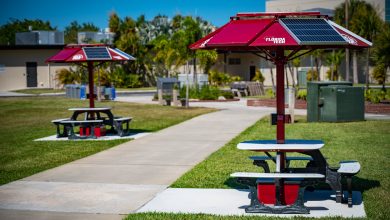Molecular biology major finds fish could be the key to Alzheimer’s
Could fish be the key to understanding Alzheimer’s?
Just like your teeth, gel-like plaque can build up on the brain and cause healthy neurons to loose connections with each other, killing cells and eventually leading to neurodegenerative conditions like Alzheimer’s and Parkinson’s disease.
Brain plaque is the result of the accumulation of proteins that don’t align correctly, known as protein misfolding. It’s not completely known why the proteins misfold, but when they accumulate, they can have dire effects.
“It’s intrinsically disordered , the proteins start mismatching, tumbling around, looking for a structure they’re satisfied with, but never quite gets there,” said molecular biology major, Benjamin Orris, who is researching this phenomena with a little help from some fish.
So what do fish have to do with Alzheimer’s?
Many organisms are afflicted with protein misfolding, and this aggregation of protein in fish is caused by urea.
“When fish make deep dives, urea builds up in their tissue which can cause proteins to misfold much like what happens in the human brain,” said Orris.
Fortunately for the fish, they have developed a solution to this build-up of urea – Trimethylamine N-Oxide.
Trimethylamine N-Oxide works to stabilize the proteins and provide an environment where they are less likely to misfold and cause tissue damage.
“Nature provides a whole bunch of solutions that we haven’t looked into yet.”
Untangling Protein Misfolding
Protein misfolding is a pervasive issue that can affect anything from bacteria to the human brain, so the research has the potential to apply to a vast amount of similar or parallel conditions.
“I have to give the credit to my adviser, Dr. Shaohua Xu. He invited me to work in his lab and gave me this project early on in my sophomore year,” Orris said. Like all good science, the inspiration for it is simply a spirit of curiosity and a desire to learn.”
With Alzheimer’s ranked as the sixth leading cause of death in the U.S., protein misfolding research like Orris’s provides much needed insight in combating Alzheimer’s as well as other neurodegenerative conditions.
“Through this work, we hope to better understand the mechanism by which protein aggregates damage tissues,” Orris said. “We also hope to identify targets and strategies for pharmaceutical intervention in protein aggregation related diseases.”
Orris showed his project results at the 2017 Northrop Grumman Engineering & Science Student Design Showcase and took home the President’s Cup Award for the College of Science.
“If someone had told me two years ago that I would win the President’s Cup for my undergraduate research, I would have thought they were crazy,” Orris said.

%CODE1STUDENTDESIGN%





